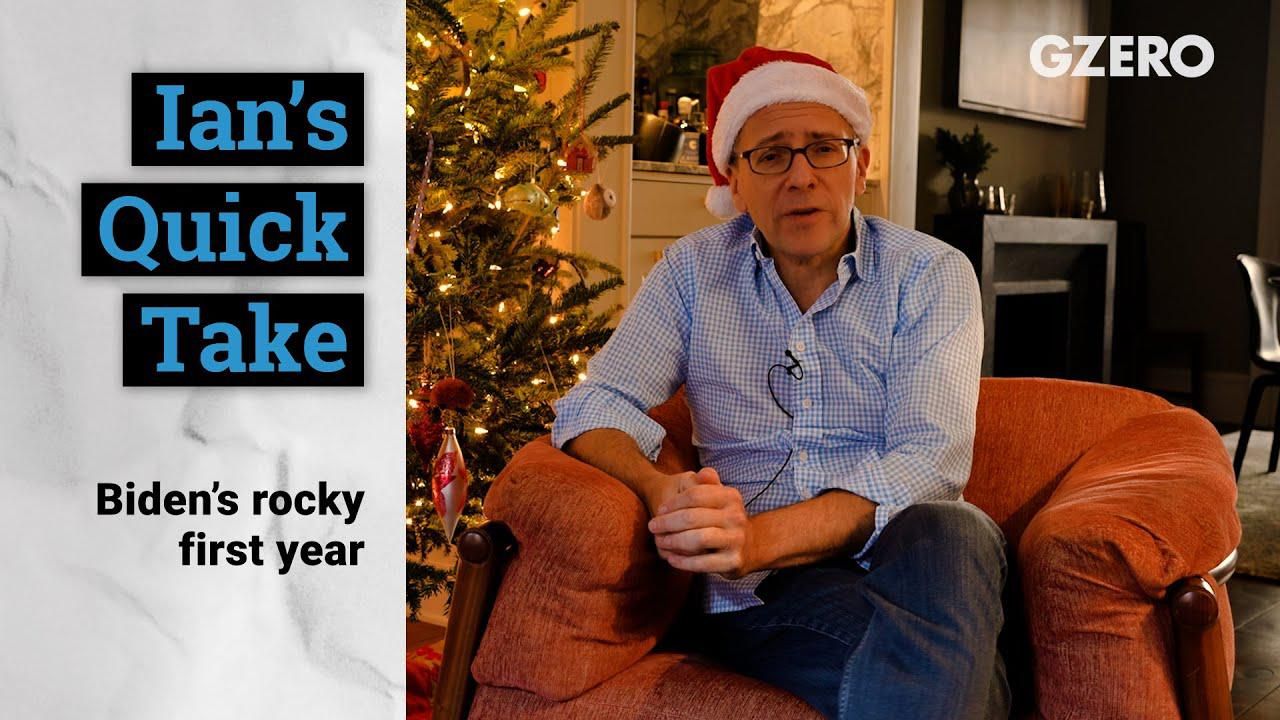December 20, 2021
Ian Bremmer's Quick Take:
It's been a very tough week in the United States, both because in New York, and, of course, the glad tidings of New York very quickly come to a theater near you, are increasingly concerns about breakthrough COVID cases. The potential for hospitals to get overwhelmed, even if omicron turns out to be significantly milder than previous variants. If you have 10X the number of cases and one-third the hospitalizations, you're still going to overwhelm hospitals. And what happens in New York does not stay in New York. It's not like Vegas here. It goes to the rest of the world and it goes across the country.
This, of course, is a real problem for the Biden administration that entered the presidency saying that we were all going to be independent from COVID by July 4th. That is not the case. We're still wearing masks. We still need boosters. And we're still dealing with all of this and we will be, and that is making life much more difficult for Biden. As is the fact that Senator Joe Manchin individually decided to put an end to the administration's effort to Build Back Better. Joe Manchin putting some coal in Joe Biden's stocking for Christmas. And that means that this signature piece of legislation that Biden would have hoped for his entire presidency is not happening. Maybe they'll find one or two pieces of it that they can get done next year, but it is a tiny sliver of what they were hoping for. And that's why you see the White House and members of the Democratic Party leadership so angry and hostile at Manchin right now, it's a big present for the Republicans.
So, in terms of the domestic politics of the presidency, the first year has been really challenging. Some of that is Biden's fault. I mean, the delinking of infrastructure bill from Build Back Better did allow them to get that $1.3 trillion passed, and that is significant, it is a win, it's something that the Trump administration and many administrations were unable to do. And Lord knows the Americans need to invest in infrastructure. They even got a fair number of Republicans to support the bill, showing you that even in this level of partisanship, obviously, good ideas reflect common sense and can pick up support. But beyond that, there's not much you can focus on from a legislative perspective that they're going to be able to get done, that they have been able to get done. And that's going to lead to very low approval ratings together with the fact that you didn't get vaccines and boosters rolled out, boosters particularly, rolled out across the population as quickly as you might have. The US still is really nowhere on testing. And you've seen all those lines in the tri-state area and you'll see them in other places as well.
So, I mean, Biden, on the merits, has been okay in responding to COVID. But of course the buck stops with the president and whatever the performance is, that's the way you're going to look at his success. And right now, almost a year in, with Americans facing an enormous wave from omicron, people not going to be very happy with him for that. On the foreign policy side, I would argue that there've been significant successes, and there's also been quite a few failures. Some of those failures are self-imposed. Some of those failures are constraints of massive division inside the United States. On successes, the transatlantic relationship, even with France, but across the board, is considerably stronger and more functional than it was under the Trump administration. There've been some wins, for example, on trade with the removal of the steel and aluminum tariffs, the Section 232, with the end of the fights between Boeing and Airbus facilitated by the administration, with the alternative minimum tax that was started with the US and the EU, but now is agreed upon by all of the OECD. That is, those are all significant. They're not massive, monumental, but they're significant economic wins that help to build trust in the transatlantic relationship.
More For You
- YouTube
In this Quick Take, Ian Bremmer addresses the killing of Alex Pretti at a protest in Minneapolis, calling it “a tipping point” in America’s increasingly volatile politics.
Most Popular
- YouTube
Who decides the boundaries for artificial intelligence, and how do governments ensure public trust? Speaking at the 2026 World Economic Forum in Davos, Arancha González Laya, Dean of the Paris School of International Affairs and former Foreign Minister of Spain, emphasized the importance of clear regulations to maintain trust in technology.
- YouTube
Will AI change the balance of power in the world? At the 2026 World Economic Forum in Davos, Ian Bremmer addresses how artificial intelligence could redefine global politics, human behavior, and societal stability.
Ian Bremmer sits down with Finland’s President Alexander Stubb and the IMF’s Kristalina Georgieva on the sidelines of the World Economic Forum to discuss President Trump’s Greenland threats, the state of the global economy, and the future of the transatlantic relationship.
© 2025 GZERO Media. All Rights Reserved | A Eurasia Group media company.
